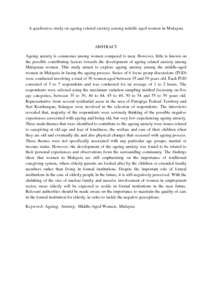Citation
Minhat, Halimatus Sakdiah and Sahharon, Hamizah and Mohd Zulkefli, Nor Afiah
(2015)
A qualitative study on ageing related anxiety among middle aged women in Malaysia.
Malaysian Journal of Public Health Medicine, 15 (2).
pp. 1-7.
ISSN 1675-0306
Abstract
Ageing anxiety is commoner among women compared to men. However, little is known on the possible contributing
factors towards the development of ageing related anxiety among Malaysian women. This study aimed to explore
ageing anxiety among the middle-aged women in Malaysia in facing the ageing process. Series of 6 focus group
discussions (FGD) were conducted involving a total of 36 women aged between 35 and 59 years old. Each FGD
consisted of 5 to 7 respondents and was conducted for an average of 1 to 2 hours. The respondents were selected
using the maximum variation sampling method focussing on five age categories, between 35 to 39, 40 to 44, 45 to 49,
50 to 54 and 55 to 59 years old. Representative from several residential areas in the area of Putrajaya Federal
Territory and Seri Kembangan, Selangor were involved in the selection of respondents. The interviews revealed that,
majority of the respondents were seriously thinking of the possible negative experiences associated with ageing and
being old, but very few experiencing ageing anxiety. Three main themes that were identified to contribute to the
ageing anxiety were issues related to caregiving at old age and fear of loneliness, the welfare and care of their
children when they are old and eventually die and also physical changes that occurred with ageing process. These
themes were not specifically associated with any particular age groups, marital or income status. However, the
development of the ageing anxiety was found to be related to their personal experiences and observations from the
surrounding community. The findings show that women in Malaysia are still emphasizing on the importance of
traditional caregiving system, where elderly parents are looked after by the children or extended family members
rather than living in formal institutions. Despite the important role of formal institutions in the care of elderly
people in the future, it is still negatively perceived. With the shrinking of the size of nuclear family and massive
involvement of women in employment sector, more elderly will be expected to reside in formal institutions in the
near future. Relevant authorities should be made aware on the importance to maintain the quality of care in the
formal institution for elderly, in order to tackle the negative perceptions.
Download File
![[img]](http://psasir.upm.edu.my/43443/1.hassmallThumbnailVersion/A%20qualitative%20study%20on%20ageing%20related%20anxiety%20among%20middle%20aged%20women%20in%20Malaysia%20%281%29.pdf)  Preview |
|
PDF (Abstract)
A qualitative study on ageing related anxiety among middle aged women in Malaysia (1).pdf
Download (7kB)
| Preview
|
|
Additional Metadata
Actions (login required)
 |
View Item |

